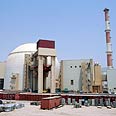
Iran's Bushehr nuclear facility (archives)
צילום: רויטרס
Report: 2 years left for solution to Iranian threat
Senior US advisor believes still time to see if sanctions cause Iranian regime to back down or fall. New York Times: Evaluation unacceptable to Israel
WASHINGTON - The US government believes there is still a window of two years in which to solve the Iranian nuclear issue by diplomatic means, the New York Times reported Tuesday.
The paper also quoted Gary Samore, special assistant to President Barack Obama and White House Coordinator for Arms Control and Weapons of Mass Destruction, who said to European experts there is still time to check whether sanctions will cause the Iranian regime to back down or even fall.
However, the newspaper also reported that this US evaluation is unacceptable to Israel, Britain and France, whose own evaluations are more urgent regarding the amount of time still available before a military option must be exercised. Furthermore, the newspaper said Israel would almost certainly not wait for the US if Iran goes beyond the "point of no return."
A poll conducted by the German Marshall Fund reveals that some 68% of Americans and 58% of French citizens prefer military action over accepting a nuclear Iran. This data reflects the growing pressure on Obama, particularly from Jewish members of Congress, to think of the next stage in handling the Iranian nuclear threat.
Meanwhile, the process of tightening sanctions against Iran continues. The Bloomberg network reported Tuesday that sanctions imposed by Japan on the Islamic Republic will reduce the quantity of crude oil exported by Iran by some 25%. Tokyo announced Monday it is suspending its investments in oil and gas in Iran, mainly due to the latest round of sanctions imposed against Iran by the US.
Leading oil companies have joined Japan, including the UK-Dutch firm Shell, the French giant Total, Italy's ENI and Norway's Statoil. This means a significant reduction in Iran's oil exports, a reduction of Iran's ability to import distillates, a halt to work in existing oil fields and a freeze on development at new oil and gas fields in Iran.
The latest report from the US Government Accountability Office asserts that since the last sanctions law was passed on July 1, only five Chinese companies, one UAE company and one Singaporean company are still selling distillates to Iran despite the embargo. Of the 16 companies investigated, 11 halted all business with Iran immediately (the companies are those with investments of more than $20 million in Iran).
Meanwhile, Naftiran, a subsidiary of Iran's national oil company, has been added to the blacklist of companies with which the US forbids American firms from doing business. Last week, the Swiss ambassador to Tehran, who handles US interests in the Islamic Republic, was called for talks on this issue.
- Follow Ynetnews on Facebook










